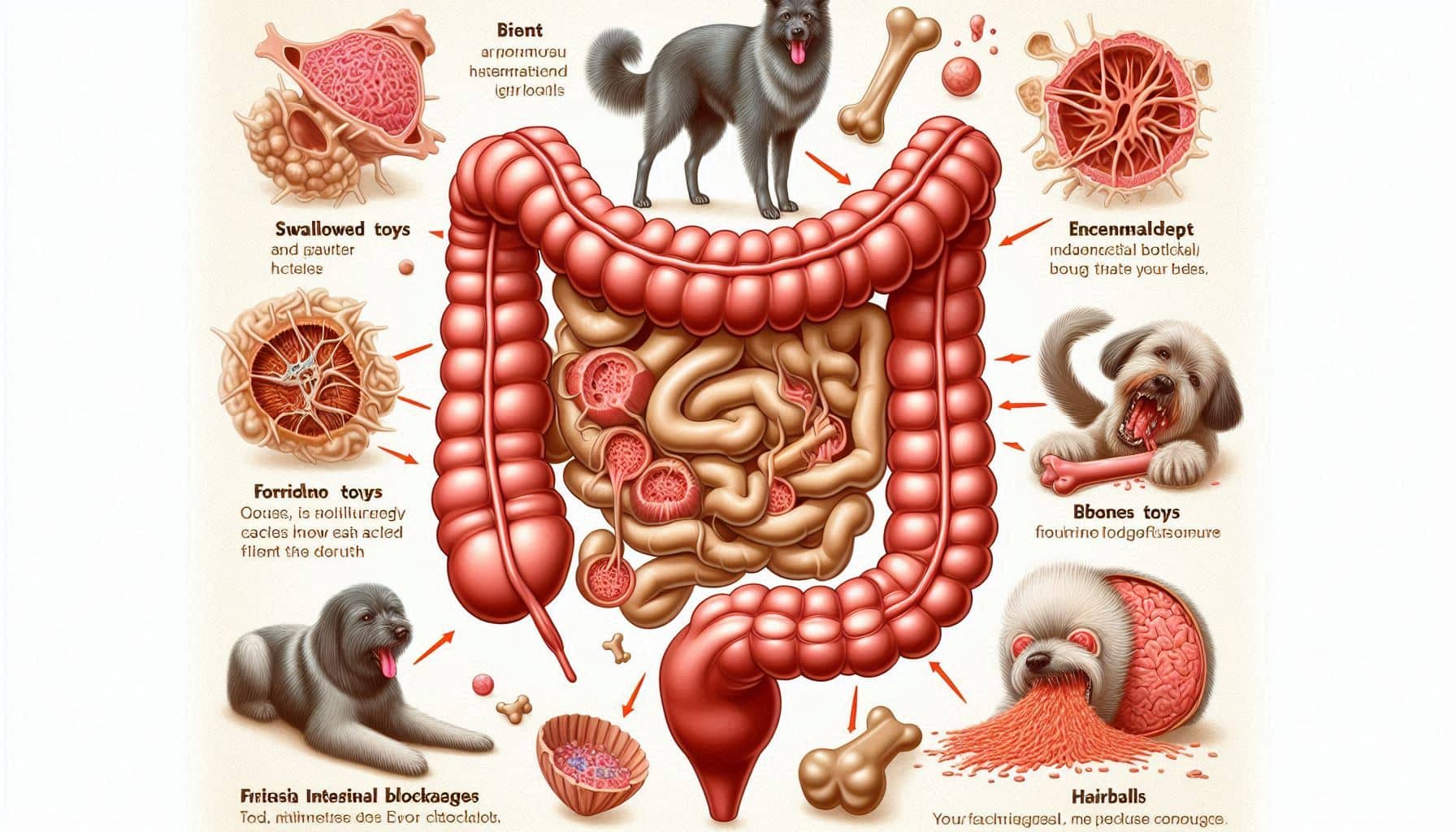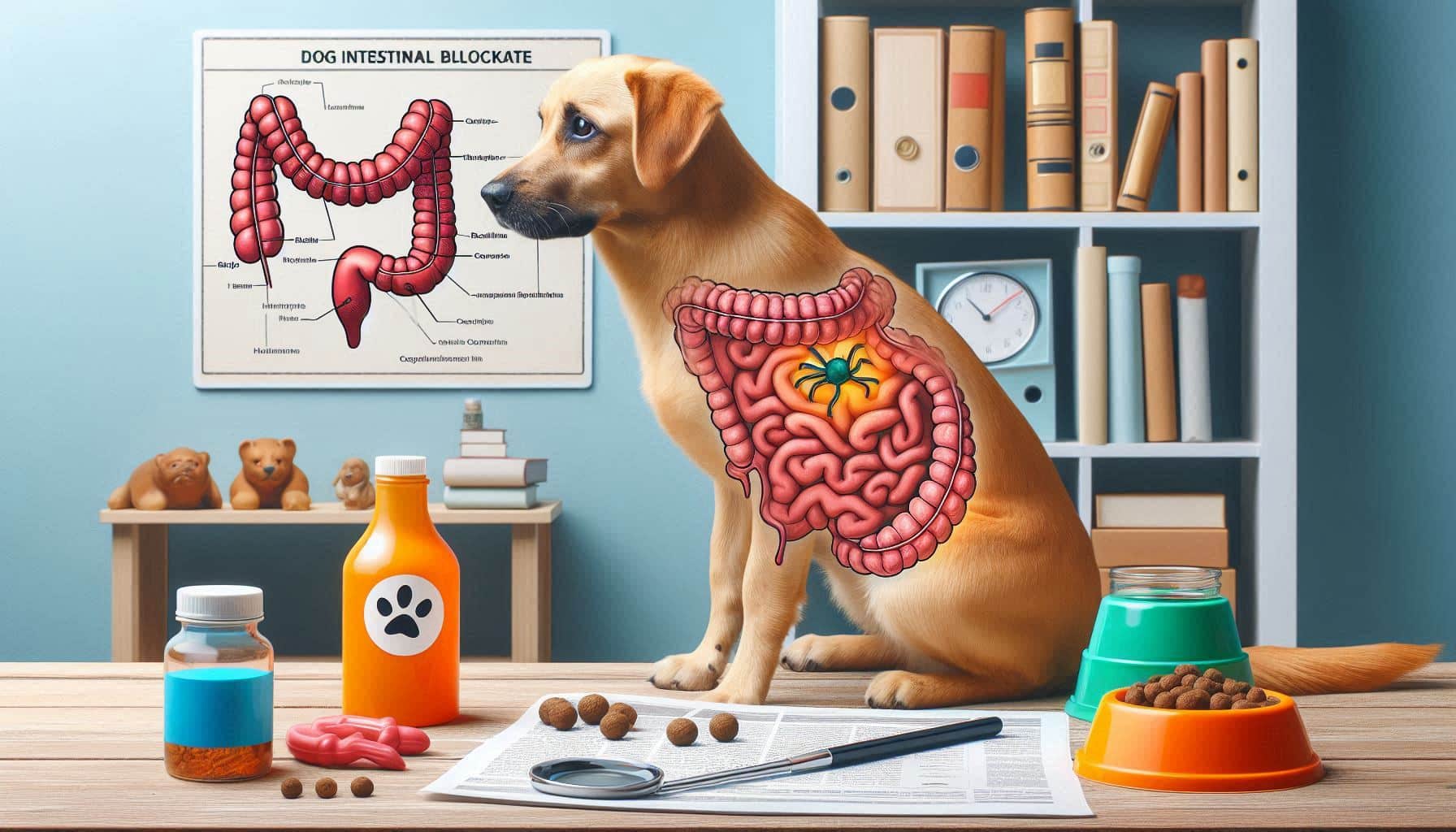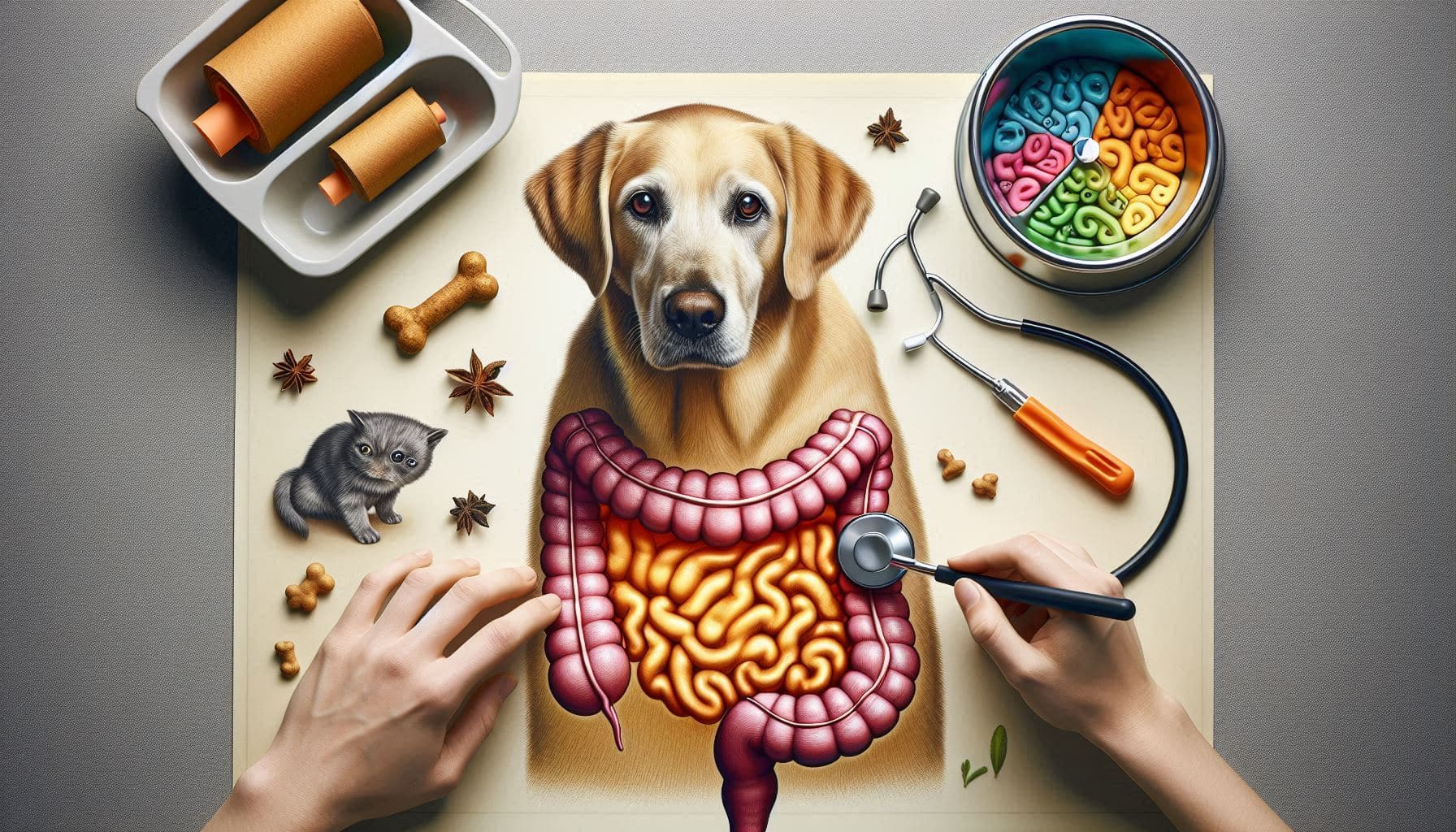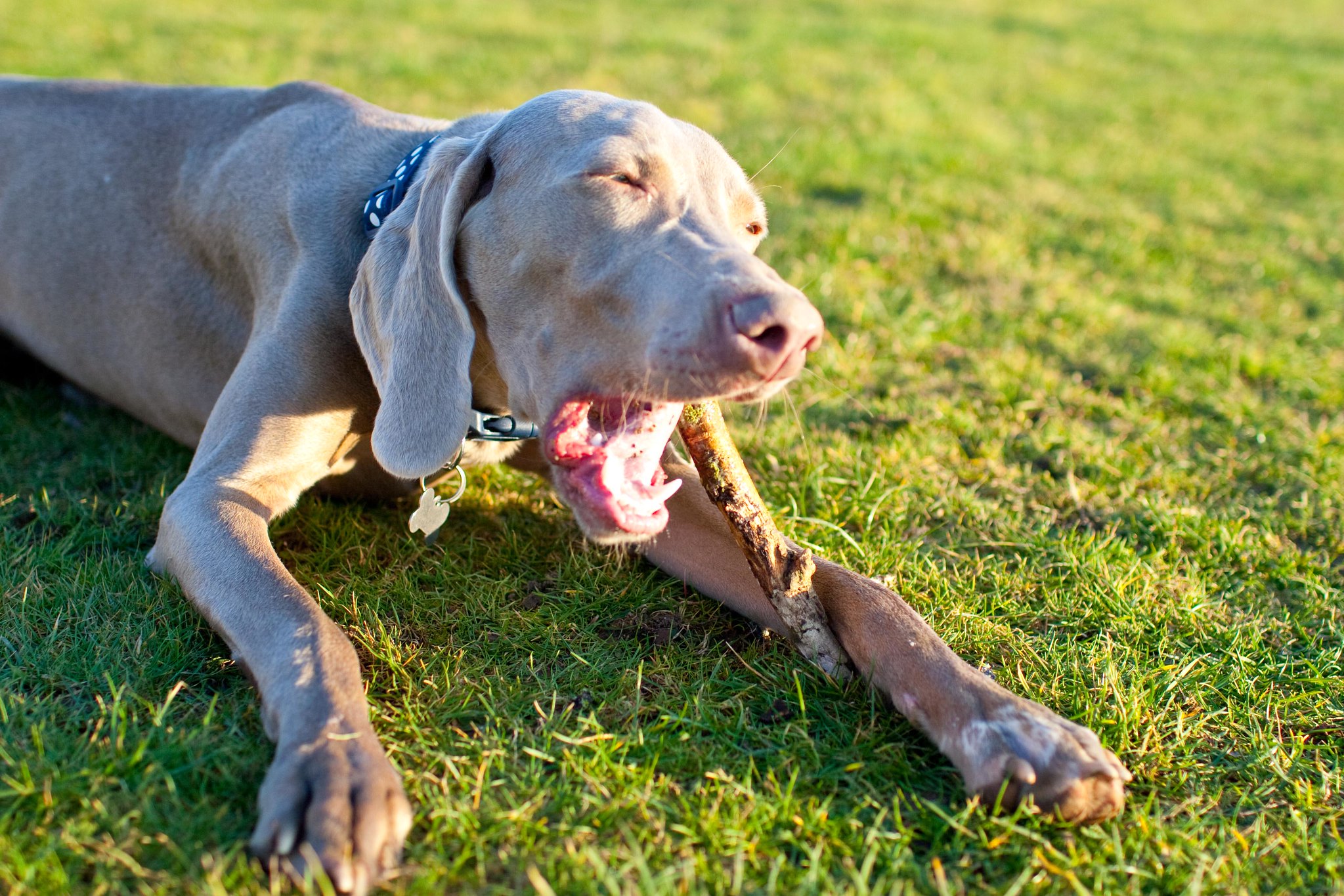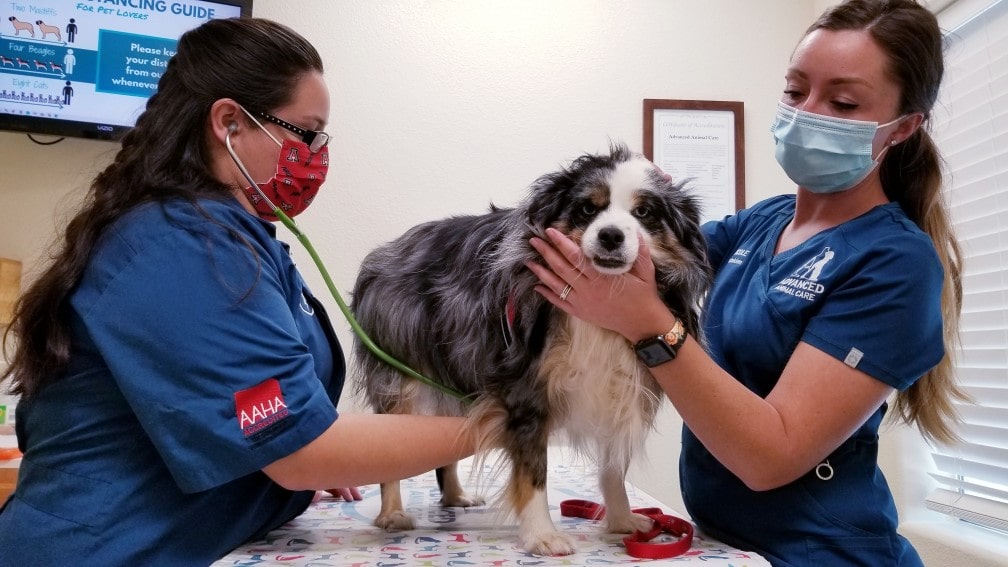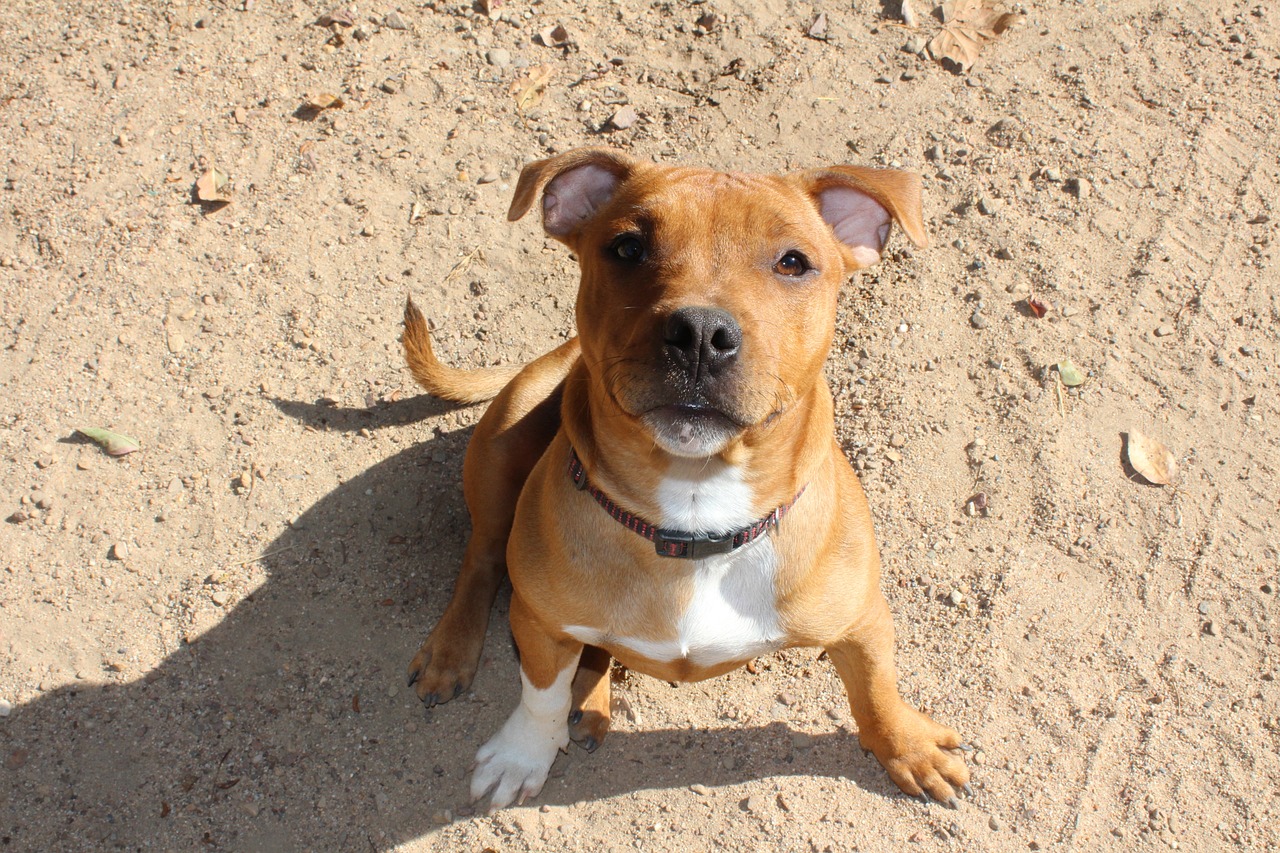Have you ever wondered why your dog acts gluttonously, eating up anything and everything with your scent? From socks to rocks, our pets are exceptionally skilled at finding and consuming unusual items. What happens when their quest for riches results in dog intestinal blockage?
Think about the following situation: Fido, your usually energetic pooch, abruptly changes his mind and settles down to be a couch potato. He is no longer lively, not taking his favorite goodies, and seems restless. It might be something more than a simple stomach ache; It could be a dog intestinal blockage causing his discomfort.
Let’s look at the dog’s digestive system, investigate intestinal obstructions, and discover how to avoid and manage this dangerous condition.
What Is an Intestinal Blockage in Dogs?
Intestinal blockage, or bowel obstruction, occurs when the intestines are blocked, hindering the passage of liquids and solid excrement. This can lead to nutrient and water absorption issues, electrolyte imbalance, and even dehydration.
Types of Intestinal Blockage in dogs include mechanical or functional blockages.
Mechanical Obstruction: This type occurs when a physical object is in the way of excretion. It is most common in the small intestine, and its frequent symptom is acute vomiting in your dogs.
Functional Obstruction: This occurs when the intestines fail to function correctly. This stops the rhythmic movement of digested food flow. This type of intestinal blockage usually is an existing health issue that requires treatment.
Causes of Intestinal Blockages
Dog intestinal blockage, also known as Bowel Obstruction in dogs, is a severe condition that can cause many significant problems for your beloved companion. Factors causing obstruction include:
Foreign Objects: Dogs often explore their environment by chewing on items such as toys, bones, or fabrics, which can potentially cause a blockage in their intestines.
Intestinal Parasites: An abundant presence of worms can block the intestines.
Tumors: Whether benign or malignant, both types of tumors can compress the wall of the intestine, narrowing the passage and potentially causing a blockage.
Intestinal Invagination occurs when one part of the intestine slides into another, resulting in a blockage.
Hairballs can develop in breeds with long hair due to excessive grooming, causing buildup and blockages.
Medications: Certain drugs may lead to complications that could lead to a blockage in the intestines.
The Serious Side of Blockages
Because blockages press against the walls of the intestines, the tissue may die (a condition known as necrosis) or even rupture or perforate. Envision attempted to navigate a tunnel that abruptly collapsed in the center.
Spotting the Signs of Dog Intestinal Blockage
If you witness your dog consuming something inappropriate, do not try to intervene on your own. Medical attention is crucial for animals.
However, signs of dog intestinal blockage condition consist of throwing up, experiencing loose stools, having difficulty passing stool, feeling discomfort in the abdomen, and lacking energy. Prompt veterinary attention is essential for appropriate care. Here are some symptoms to watch out for:
- Vomiting: Dog vomiting is the most common sign of an undigested foreign body, but dogs can vomit for many other reasons. If vomiting persists for more than a day and it smells like feces, has blood, or resembles coffee grounds, call your vet ASAP.
- Gagging or Retching: Trying to vomit without success can be more problematic than vomiting.
- Loss of Appetite: Take notice if your food-loving dog suddenly refuses to eat despite offering his favorite treat.
- Weakness: Lethargy indicates your dog doesn’t feel well.
- Diarrhea: Surprisingly, dog diarrhea can also be a sign of a partial blockage.
- Straining to Poop: If your dog is trying but nothing’s coming out, it could be a blockage.
- Painful Abdomen: If your dog flinches or whines when you touch their belly, it’s time to call the vet.
- Bloating: If your dog seems restless, can’t vomit, and has a swollen belly, it could be bloated, which is super serious.
- Dehydration and Restlessness: Unusual restlessness often signifies discomfort, nausea, or pain.
- Aggressive Behavior When Touched: If your usually friendly dog snaps when you touch their belly, take it seriously.
- Prayer Position: If your dog adopts this stance (forelegs down, hind end up), it often indicates abdominal pain.
Other than these signs, a vet may conduct a physical exam, observing the abdominal area. Blood tests and medical imaging, such as X-rays or endoscopy, are also frequently required. For further investigation, a small camera is sometimes inserted into your dog’s stomach to see where the blockage has occurred.
Treatment for Intestinal Blockages in Dogs
Intestinal blockages can be treated surgically or non-surgically, depending on factors such as location, time since obstruction, and the object’s size, shape, and structure. Certain items can pass through your dog’s digestive system naturally, but timing is crucial for intestinal blockages in dogs.
Monitor your dog’s vital signs closely for any changes. Observe symptoms such as vomiting, lack of appetite, lethargy, and breathing patterns. Look for evidence of the obstruction passing through your dog’s system. Large objects may be vomited up without harming the dog’s health.
If the foreign object does not pass and the dog shows symptoms of discomfort, immediate treatment is necessary. Even emergency surgeries may be required if the foreign object poses a severe threat.
Note: This content is meant for general knowledge and should not be a substitute for professional guidance from a veterinarian. Seek advice from a veterinarian if you have any worries about blockages in your pet’s intestines.
Surgery for Dogs with Intestinal Blockages
When it comes to blockages, don’t wait. A true blockage rarely gets better on its own and can cause more damage the longer it’s left untreated. In severe cases, surgical intervention is the only way through. Remember, it’s better to be safe than sorry!
Undergoing surgery means receiving anesthesia, and that, in itself, is a significant medical intervention for your four-legged friend. Later, the veterinarian cuts near the obstruction and extracts the item.
The outcome of the surgery relies on multiple factors, such as the foreign object’s size, shape, and position, the duration it has been lodged, and your dog’s general well-being.
Aftercare and Recovery
After surgery, the initial 3 days are crucial. If your dog is improving, the likelihood of a successful recovery is high, but the possibility of complications such as sepsis, low protein levels, or wound splitting is present.
Post-surgery, keep your dog calm and rested. Short walks are okay, but no running or jumping. Use a cone to stop them from licking the incision.
For feeding them, start with small amounts of bland food before gradually returning to their regular diet. Your vet will prescribe pain medications and possibly anti-nausea meds.
The Cost of Surgery
Intestinal blockage surgery isn’t cheap, ranging from $800 to $7,000, depending on various factors. But here’s the silver lining: prevention is possible!
Preventing Intestinal Blockages
Dogs are notorious for swallowing all sorts of strange items. The list of things vets have found is like a Believe-It-or-Not post: stones, rawhides, balls, toys, lightbulbs, underwear, and even a cell phone have found their way to a dog’s intestines! Food items like corn cobs, nuts, and fruit pits can cause blockages.
So, to prevent Intestinal blockages in dogs, here are some tips:
- Put Away Potential Hazards: Keep small objects, toys, and household items out of your dog’s reach. This way, you can be assured
- Monitor Playtime: Keep an eye on your dog when they’re playing with toys or chewing on bones.
- Secure Trash and Debris: Ensure your dog can’t scavenge through garbage inside or outside the house.
Conclusion
An intestinal blockage in dogs is a severe issue that requires vigilance and quick action. Monitoring what your dog is munching upon and be aware of any concerning symptoms.
Contacting your vet immediately if you suspect a blockage is essential for your furry friend’s health and happiness. This is a life-threatening event that can deprive the intestines of blood flow, leading to tragic consequences. Surgical intervention may be necessary, despite the cost, to prevent your dog from suffering or dying.
Prioritizing your dog’s well-being by seeking professional veterinary advice is crucial in emergencies.
FAQs
Can a dog still poop with a blockage?
If a dog has a complete blockage in its intestines, it may only be able to pass what is already behind it, and nothing more will come out. A partial obstruction, which can be just as serious as a complete one, often allows stool to pass, but it may appear as diarrhea, flat stool, or soft stool. In any case, a vet visit is necessary.
How long can a dog live with an intestinal blockage?
Without treatment, a dog with a complete blockage may die within 3-4 days. Surgery is often necessary to remove the blockage and save the dog’s life.
What can I do if my dog has an intestinal blockage?
If you suspect your dog has an intestinal blockage, take them to be examined by a veterinarian immediately. The vet will help you determine whether or not your dog needs surgery and how to proceed.


